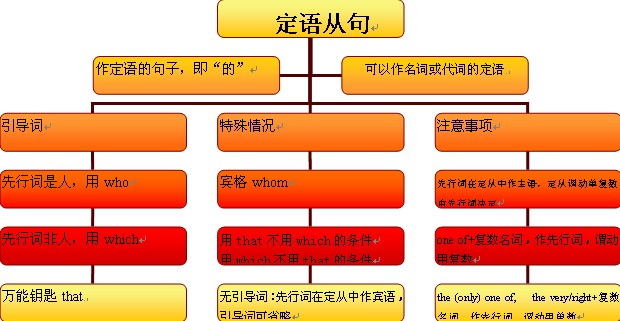本试题 “You can only be sure of _____ you have at present; you cannot be sure of something _____ you might getin the future.[ ]A. that; whatB. what; /C. wh...” 主要考查您对限制性定语从句
宾语从句
等考点的理解。关于这些考点您可以点击下面的选项卡查看详细档案。
- 限制性定语从句
- 宾语从句
限制性定语从句的概念:
限制性定语是指对被修饰名词或代词的必需修饰,是被修饰名词或代词不可缺少的修饰语,如果去掉它句子意思往往会不明确或会发生变化。
如:The travellers knowing about the floods took another road. 知道发大水的那些游客改道走了。
The boys wanting to play football were disappointed when it rained. 想踢足球的那些男孩子因为下雨而感到失望。
关系代词引导的定语从句:
关系代词所代替的先行词是人或物的名词或代词,并在句中充当主语、宾语、定语等成分。关系代词在定语从句中作主语时,从句谓语动词的人称和数要和先行词保持一致。
1)who, whom, that 这些词代替的先行词是人的名词或代词,在从句中所起作用如下:
例:Is he the man who/that wants to see you? 他就是你想见的人吗?(who/that在从句中作主语)
He is the man whom/that I saw yesterday. 他就是我昨天见的那个人。(whom/that在从句中作宾语)
2)Whose用来指人或物,(只用作定语,若指物,它还可以同ofwhich互换)
例:They rushed over to help the man whose car had broken down. 那人车坏了,大家都跑过去帮忙。
Please pass me the book whose(of which) coverisgreen. 请递给我那本绿皮的书。
3)which, that 它们所代替的先行词是事物的名词或代词,在从句中可作主语、宾语等。
例如:A prosperity which/that had never been seen before appears in the countryside. 农村出现了前所未有的繁荣。(which/that在句中作宾语)
The package(which/that) you are carrying is about to come unwrapped.你拿的包快散了。(which/that在句中作宾语)
关系副词引导的定语从句:
关系副词可代替的先行词是时间、地点或理由的名词,在从句中作状语。
1)when, where, why 关系副词when, where, why的含义相当于“介词+which”结构,因此常常和“介词+which”结构交替使用。
例如:There are occasions when(on which) one must yield.任何人都有不得不屈服的时候。
Beijing is the place where(inwhich) I was born. 北京是我的出生地。
Is this the reason why(for which) he refused our offer? 这就是他拒绝我们帮助他的理由吗?
2)that代替关系副词 that可以用于表示时间、地点、方式、理由的名词后取代when, where, why和“介词+which”引导的定语从句,在口语中that常被省略,
例如:His father died the year(that/when/in which) he was born. 他父亲在他出生那年逝世了。
He is unlikely to find the place(that/where/in which) he lived forty years ago. 他不大可能找到他四十年前居住过的地方。
限定性定语与非限定性定语的区别:
1、形式不同:
限定性定语从句主句和从句之间不用逗号隔开,口语中使用时也不停顿;而非限定性定语从句与主句之间通常有逗号隔开,口语中使用时有停顿。
2、功能不同:
限定性定语从句用于对先行词的意义进行修饰、限制和识别,如果去掉,就会造成句意不完整或概念不清;而非限定性定语从句用于对先行词起补充说明作用,如果省略,句意仍然清楚、完整:
如:People who take physical exercise live longer. 进行体育锻炼的人活得长些。(若把从句去掉句子就失去意义)
His daughter, who is in Boston now, is coming home next week. 他女儿现在在波士顿,下星期回来。(若把从句去句子意义仍然完整)
3、翻译不同:
在翻译定语从句时,一般把限定性定语从句翻译在它所修饰的先行词之前,而把非限定性定语从句与主句分开:
如:He is the man whose car was stolen. 他就是汽车被窃的那个人。
I've invited Jim, who lives in the next flat. 我邀请了吉姆,他就住在隔壁。
4、含义不同:
如:I have a sister who is a doctor. 我有一个医生的姐姐。(姐姐不止一个)
I have a sister, who is a doctor. 我有一个姐姐,她是当医生的。(只有一个姐姐)
5、先行词不同限定性定语从句的先行词只能是名词或代词,而非限定性定语从句的先行词则可以是名词或代词,也可以是短语或句子;
另外,当先行词为专有名词或其他具有独一无二性的普通名词时,通常要用非限制性定语从句,而不用限制性定语从句:
如:Peter drove too fast, which was dangerous. 彼得开车很快,这是很危险的。(which指drive too fast)
He changed his mind, which made me very angry. 他改变了主意,这使我很生气。(which指整个主句)
Mr.Smith, who is our boss, will leave for Japan next week. 我们的老板史密斯先生下周要去日本。(先行词为专有名词,要用非限制性定语从句修饰)
Her father, who has a lot of money, wishes her to study abroad. 她父亲很有钱,希望她出国学习。(先行词为表独一无二意义的普通名词,要用非限制性定语从句修饰)
6、关系词不同:
关系词that和why可用于限制性定语从句中,通常不用于非限制性定语从句;另外,在限制性定语从句中,关系词有时可以省略,而在非限制性定语从句中关系词一律不省略。
判断关系代词与关系副词方法:
一:用关系代词,还是关系副词完全取决于从句中的谓语动词。及物动词后面无宾语,就必须要求用关系代词;而不及物动词则要求用关系副词。
例如:This is the mountain village where I stayed last year.
I'll never forget the days when I worked together with you.
判断改错
(错)This is the mountain village where I visited last year.
(错)I will never forget the days when I spent in the countryside.
(对)This is the mountain village(which) I visited last year.
(对)I'll never forget the days(which) I spent in the countryside.
注:习惯上总把表地点或时间的名词与关系副词where, when联系在一起。此两题错在关系词的误用上。
二:准确判断先行词在定语从句中的成分(主、谓、宾、定、状),也能正确选择出关系代词/关系副词。
例1. Is this museum ___ you visited a few days age?
A. where
B. that
C. on which
D. the one
例2. Is this the museum ____ the exhibition was held.
A. where
B. that
C.on which
D. the one
答案:例1:D,例2:A
例1变为肯定句:This museum is___ you visited a few days ago.
例2变为肯定句:This is the museum ___ the exhibition was held.
注:在句1中,所缺部分为宾语,而where, that, on which都不能起到宾语的作用,只有the one既做了主句的表语,又可做从句的宾语,可以省略关系代词,所以应选D。
而句2中,主、谓、宾俱全,从句部分为句子的状语表地点,既可用副词where,又因in the museum词组,可用介词in+which引导地点状语。
而此题中,介词on用的不对,所以选A。关系词的选择依据在从句中所做的成分,先行词在从句中作主、定、宾语时,选择关系代词(who,whom,that,which,whose);
先行词在从句中做状语时,应选择关系副词(where地点状语,when时间状语,why原因状语)。
定语从句知识体系:

关系代词that的用法:
1)不用that的情况:
a)在引导非限定性定语从句时。
如:(错)The tree, that is four hundred years old, is very famous here.
b)介词后不能用:
如:We depend on the land from which we get our food.
We depend on the land that/which we get our food from.
2)只能用that作为定语从句的关系代词的情况
a)在there be句型中,只用that,不用which。
b)在不定代词,如:anything, nothing, the one, all, much, few, any, little等作先行词时,只用that,不用which。
c)先行词有the only, the very修饰时,只用that。
d)先行词为序数词、数词、形容词最高级时,只用that。.
e)先行词既有人,又有物时。
例:All that is needed is a supply of oil. 所需的只是供油问题。
Finally, the thief handed everything that he had stolen to the police. 那贼最终把偷的全部东西交给了警察。
宾语从句的概念:
置于动词、介词等词性后面起宾语作用的从句叫宾语从句。宾语从句的语序必须是陈述语序。谓语动词、介词、动词不定式,v.-ing形式后面都能带宾语从句。有些形容词(afraid, sure, glad等)之后也可以带宾语从句。
宾语从句的用法:
1、宾语从句的引导词:
宾语从句通常由连词that和whether(if)、连接代词或连接副词以及关系代词型what引导:
如:We believe that he is honest. 我们相信他是诚实的。
I don't know whether he'll arrive in time. 我不知道他是否能及时到。
I don't know who(m) you mean. 我不知道你指谁。
He asked why he had to go alone. 他问他为什么必须一个人去。
Please tell me which you like. 告诉我你喜欢哪一个。
She has got what she wanted. 她要的东西得到了。
注:有时介词后可接跟一个宾语从句(但介词后通常不接that和if引导的宾语从句):
如:From what you say, he is right. 根据你所说的,他是对的。
有极个别介词(如but,except)可接that引导的宾语从句:
如:She remembered nothing about him except that his hair was black. 她对他什么都不记得,只记得他的头发是黑的。
2、宾语从句与形式宾语it:
当宾语从句后跟有宾语补足语时,通常在宾语从句处使用形式宾语it,而将真正的宾语从句移至句末:
如:I think it best that you should stay here. 我认为你最好住这儿。
He hasn't made it known when he is going to get married. 他还没宣布他何时结婚。
3、连词that的省略问题:
引导宾语从句的连词that通常可以省略:
如:She said(that) she would come to the meeting. 她说过要来开会的。
I promise you(that) I will be there. 我答应你我会去。
注:有时为了强调,that引导的宾语从句可位于句首,此时that不可省略:
如:That she is a good girl I know. 她是一个好姑娘,我是知道的。
4、宾语从句与否定转移当动词think, believe, suppose, expect, imagine后接一个表示否定意义的宾语从句时,其否定通常转移到主语:
如:I don't suppose that it is true. 我认为那不是真的。
I don't imagine that he will come. 我想他不会
使用宾语从句特别注意:
一、宾语从句的语序:
宾语从句的语序是陈述句语序即:连接代词/副词+主语+谓语+其他成分。
如:I don't know what they are looking for.
Could you tell me when the train will leave?
Can you imagine what kind of man he is?
二、宾语从句的时态:
主句是一般现在时,从句根据实际情况使用任何时态。
句:The headmaster hopes everything goes well.
主句是过去时态,从句须用过去时态的某种形式。
句:She was sorry that she hadn't finished her work on time.
当宾语从句表示的是一个客观真理或者事实时,即使主句是过去时,从句也用一般现在时态。
如:The teacher told his class that light travels faster than sound.
三、宾语从句的特点:
宾语从句可以作及物动词、介词及形容词的宾语。宾语从句的语序一律用陈述句语序。连接词that引导宾语从句在句中无词义,不充当句子成份,多数情况下可以省略。whether和if都可引导宾语从句,但whether后可紧跟or not;whether从句可作介词的宾语。如果从句太长,可以用形式宾语it.
与“You can only be sure of _____ you have at present; you ca...”考查相似的试题有:
- What kind of first aid should you perform in this situation ____ your nose is bleeding ?A.whichB.thatC.whoD.where
- ---Tom called me up telling me he would not take part in the match.--- _______is a pity _______ he could not join us....
- _______is known to all ,the Diaoyu Islands have been part of Chinese territory since ancient times.A.ItB.ThatC.Thi...
- Last Monday, I bought a second-hand computer, ______ was very slow.A.which priceB.its priceC.the price of whoseD....
- A team of American scientists has found a treatment to protect humans from the deadly H5N1 flu virus, ________ brings...
- Is there a hospital around _________ I can get some medicine for my wounded hand?A.whatB.thatC.whichD.where
- The latest UK official studies show _______fewer teenagers are now studying foreign languages.A.whatB.whichC.thatD...
- He bought some books, ______ were expensive.A.most of whichB.the most of whichC.most D.the most of that
- (2013·陕西宝鸡二检)The course about Chinese food attracts over 100 students per year, ________ up to half are from ov...
- The warning we were given as children ________ an apple a day keeps the doctor away may,in fact,have a scientific e...